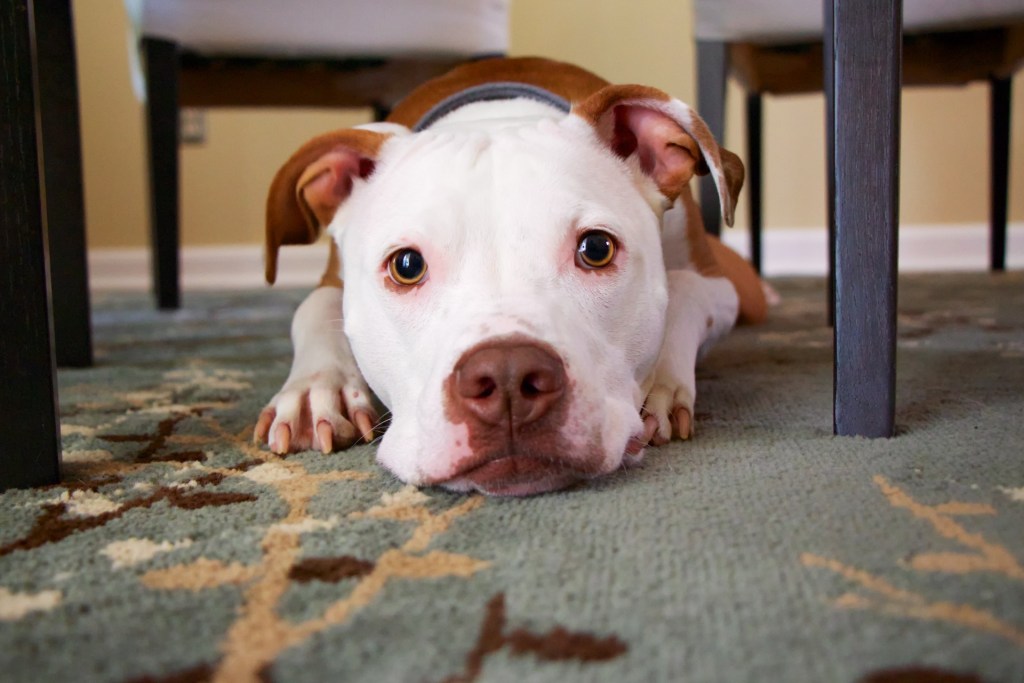Are pitbull puppies hard to train? While many people might believe that pitbulls are difficult to train, it’s important to challenge this assumption. In fact, pitbull puppies can be highly trainable and responsive to positive reinforcement techniques. With proper socialization, consistent training, and a loving environment, these puppies have the potential to become well-behaved, obedient companions.
When it comes to training pitbull puppies, understanding their history and background is crucial. Pitbulls were originally bred for bull-baiting and fighting, and unfortunately, they often get a bad reputation due to misuse and neglect by irresponsible owners. However, studies have shown that these dogs can excel in obedience, agility, and even therapy work when given the right training and care. With approximately 92% passing rate, pitbulls are shown to be more obedient than popular breeds like Beagles and Chihuahuas. By providing positive reinforcement, consistent training, and early socialization, pitbull puppies can thrive and become loving, well-mannered companions.
Pitbull puppies can be a challenge to train, but with the right approach and consistency, it’s definitely achievable. Start by establishing a routine and teaching basic commands like sit and stay. Use positive reinforcement, such as treats and praise, to reward good behavior. Consistent training sessions and socialization with other dogs and people will help develop their skills. Patience and persistence are key when training pitbull puppies, as they can be strong-willed. With dedication and proper training techniques, you can train your pitbull puppy effectively.

Are Pitbull Puppies Hard to Train?
Understanding the Breed
Pitbull puppies are known for their energetic and strong-willed nature, which can sometimes make training a challenge. However, it is important to note that every dog, regardless of breed, has its own unique personality and characteristics. When it comes to training pitbull puppies, understanding their breed traits is essential.
Pitbulls are intelligent and eager to please, making them highly trainable with the right approach. However, they can also be stubborn at times, which requires patience and consistency from the owner. It is important to establish yourself as the pack leader and use positive reinforcement techniques to motivate and reward good behavior.
When training pitbull puppies, it is crucial to start early and be consistent. Begin with basic commands such as sit, stay, and come, and gradually progress to more advanced commands. Socialization is also key, as it helps pitbulls develop good behavior around people and other animals. Overall, with the right training methods and dedication, pitbull puppies can be successfully trained.
Training Techniques for Pitbull Puppies
1. Positive Reinforcement: Pitbull puppies respond well to positive reinforcement techniques such as treats, praise, and rewards. Use these incentives to encourage good behavior and to reinforce commands. Avoid punishment-based training methods as they can cause fear and anxiety in the dog.
2. Consistency and Repetition: Pitbull puppies thrive on routine and repetition. Consistently use the same commands and cues, and repeat them several times during training sessions. Keep training sessions short and frequent to maintain the puppy’s attention span.
3. Socialization: Pitbull puppies need to be exposed to various people, animals, and environments from a young age. This helps them develop social skills and become well-rounded dogs. Take them on walks, arrange playdates with other friendly dogs, and introduce them to different environments to build their confidence.
4. Crate Training: Crate training can be beneficial for pitbull puppies, as it provides them with a safe space and helps with housebreaking. Introduce the crate gradually, making it a positive experience with treats and toys. Ensure the crate is the right size for the puppy to stand, lie down, and turn around comfortably.
5. Obedience Classes: Enrolling in obedience classes can be highly beneficial for pitbull puppies and their owners. These classes provide structured training environments, professional guidance, and opportunities for socialization. Trainers can help address specific challenges and provide personalized advice.
Common Challenges and Tips for Overcoming Them
Pitbull puppies may face certain challenges during training, but with the right approach, these can be overcome:
1. Stubbornness: Pitbull puppies can be stubborn, but consistency and positive reinforcement can help overcome this challenge. Be patient and persistent, and reward desired behaviors to encourage compliance.
2. High Energy Levels: Pitbull puppies are known for their energy, which can sometimes make training sessions challenging. To manage this, ensure they get enough physical and mental exercise before training sessions. A tired puppy is more likely to be focused and receptive to training.
3. Distractions: Pitbull puppies may get easily distracted, especially in new environments. Start training in a quiet and familiar space, gradually introducing distractions. Use high-value treats and toys to keep their attention during training.
4. Aggression: It is a misconception that pitbulls are inherently aggressive. However, early socialization and training are crucial to prevent any potential aggressive behavior. Seek the assistance of a professional trainer if you notice any signs of aggression in your pitbull puppy.
5. Biting and Mouthing: Like all puppies, pitbulls explore the world with their mouths. Teach them bite inhibition by redirecting their chewing onto appropriate toys and discouraging rough play. Consistency and positive reinforcement will help them develop good manners.
With patience, consistency, and positive training techniques, pitbull puppies can become well-behaved and obedient companions. Training should be a positive and enjoyable bonding experience for both the owner and the puppy. Remember to have realistic expectations and seek professional help if needed, ensuring that your pitbull puppy grows up to be a well-adjusted and happy adult dog.
Key Takeaways: Are Pitbull Puppies Hard to Train?
- Pitbull puppies can be challenging to train due to their strong-willed nature.
- Consistency and positive reinforcement are essential when training pitbull puppies.
- Early socialization is key to prevent potential behavior problems in pitbull puppies.
- Proper exercise and mental stimulation are crucial for a well-behaved pitbull puppy.
- Seeking professional help or attending obedience classes can greatly assist in training pitbull puppies.
Frequently Asked Questions
Are you wondering about the training process for pitbull puppies? Check out these commonly asked questions and find all the answers you need!
How can I train my pitbull puppy effectively?
Training a pitbull puppy can be a fulfilling and rewarding experience. The key to effective training is consistency, patience, and positive reinforcement. Establish a regular routine and use positive reinforcement techniques, such as treats or praise, to encourage good behavior. Break the training process into small, manageable steps and gradually increase difficulty. Remember, pitbull puppies respond best to gentle, firm, and positive training methods.
It’s also important to socialize your pitbull puppy from an early age. Expose them to a variety of people, dogs, and environments to help them become well-rounded and confident. Consider enrolling them in obedience classes or seeking guidance from a professional dog trainer to ensure you’re using effective training techniques.
Are pitbull puppies harder to train than other breeds?
Pitbull puppies are not inherently more difficult to train than other breeds, but they do require consistent and structured training. Like any other breed, pitbull puppies have their own unique characteristics and temperaments. Understanding their needs and adapting your training approach accordingly can make a significant difference.
It’s important to remember that each puppy is an individual and may learn at their own pace. Some pitbull puppies may be quick learners, while others may require more time and patience. With a positive and consistent approach, any pitbull puppy can be successfully trained.
What are some common challenges in training pitbull puppies?
While training pitbull puppies, you may encounter a few common challenges. One challenge is their strong-willed nature, which can sometimes lead to stubborn behavior. To overcome this, it’s crucial to establish yourself as the pack leader and maintain a consistent and firm approach during training sessions.
Another challenge you may encounter is their high energy levels. Pitbull puppies are known for their enthusiasm and can sometimes get easily distracted. Keeping training sessions short, engaging, and incorporating physical exercise can help keep them focused and attentive. Remember to provide mental stimulation with puzzle toys and interactive games to prevent boredom.
Can I train a pitbull puppy if I have no prior experience?
Absolutely! Training a pitbull puppy is possible even if you have no prior experience. It’s important to educate yourself about positive training methods, read training guides, and study their breed characteristics. By investing time in learning about effective training techniques and seeking guidance from professionals, you can successfully train your pitbull puppy.
Consider joining local dog training classes or online communities to connect with experienced trainers who can provide guidance and support throughout the training process. Remember, consistency, patience, and positive reinforcement are key to successful training, regardless of your prior experience.
At what age should I start training my pitbull puppy?
It’s best to start training your pitbull puppy from an early age, as this is when they are most receptive to learning and forming good habits. Generally, you can begin training your puppy as early as 8 weeks old. At this age, focus on basic commands, socialization, and potty training.
The earlier you start training, the better. Introduce simple commands like sit, stay, and come, and gradually progress to more advanced training as your puppy grows. Remember to keep training sessions short, fun, and positive to maintain their interest and enthusiasm. With early and consistent training, you can set a solid foundation for your pitbull puppy’s behavior and obedience.

Complete Pit bull puppy Training Schedule by AGE!
Summary
Pitbull puppies can be trainable with consistent and positive reinforcement methods. Start training early, be patient, and use rewards like treats and praise. Socialization with other dogs and people is important to prevent aggression.
Remember, every pitbull is unique, so be prepared for some challenges along the way. With consistent training and lots of love, you can have a well-behaved and happy pitbull companion!
